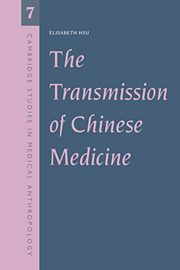Shen (Spirit?): What does it mean?
/ Elisabeth Hsu wrote an article in Culture Medicine and Psychiatry, in 2000, called Spirit (SHEN), Styles or Knowing , and Authority in Contemporary Chinese Medicine. The article is a summary of her book from 1999, The Transmission of Chinese Medicine
Elisabeth Hsu wrote an article in Culture Medicine and Psychiatry, in 2000, called Spirit (SHEN), Styles or Knowing , and Authority in Contemporary Chinese Medicine. The article is a summary of her book from 1999, The Transmission of Chinese MedicineThe book tells a cool story. In Kunming, in the late 1980's Hsu signed up to study three different forms of Chinese medicine and compared how they were transmitted. She did this as a medical anthropologist, in other words, she was always looking beyond the subject she was studying to a larger field of knowledge. This is how good social thought gets produced.
First she signed up to study TCM (Traditional Chinese Medicine) at a government college which taught clinical medicine in a TCM Hospital. Then she found a qigong master, who did treatments on difficult cases. Finally, she found a teacher of the Neijing
What she found is that each style of transmission uses the Term SHEN very differently. These differences have profound implications for how these various types of practitioners assert authority and make claims about what is real.

1. Clinical TCM: Shen is a list of observations that correspond closely with what we call functions of the brain in Bio-medicine (you know regular modern medicine.)
2. Qigong Master: Shen is a very vague idea, no one seems to be able to define it, yet people agree that it is what improves (or doesn't improve) with a series of qigong treatment performances.
3. The Neijing expert: Shen means different things in different parts of the text. The teachers uses the text which is often metaphorical or obscure, to impart his traditional knowledge and extensive experience about medicine. Thus the teacher asserts some authority about what Shen means at any one time, or in a particular context. Hsu calls this quality of having multiple meanings polysemous.
In my teaching I falls in to category 3. I use terms like qi, shen, jin, yi, to mean different things in different contexts.
